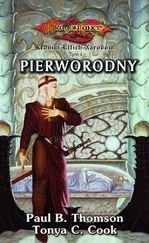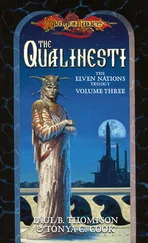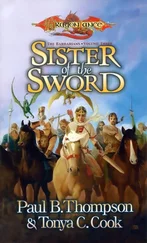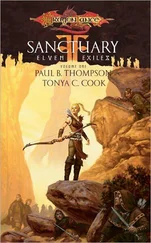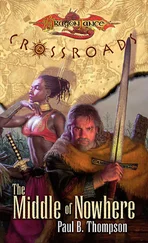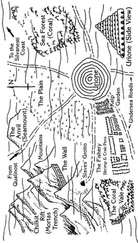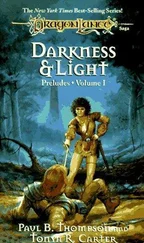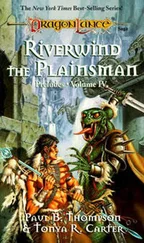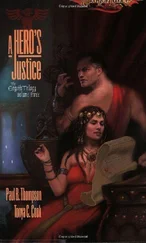“Even if you reached the city safely, we can’t be certain Sa’ida would agree to help us,” Gilthas added.
That was true. Whether Sa’ida’s help in their time of exile stemmed from true generosity of spirit or a more pragmatic desire to aid the enemies of her enemies, Kerian couldn’t say. Even if the human priestess was sympathetic to their plight, she might refuse to leave her sanctuary and undertake a journey to a haunted valley. It was well known she rarely left the temple’s sacred precincts. Kerian was confident she could persuade the woman to come back with her to the valley, but Gilthas put an end to the discussion.
“A proposed mission to Khuri-Khan is not practical. I cannot allow it.”
His peremptory tone caused Kerian to stare. He sat, frowning at no one in particular, his face so bloodlessly pale, it might have been carved of pure white Silvanesti marble. Kerian allowed the matter to drop, but while the others took a moment to pass around waterskins, she continued to observe him. He didn’t return her gaze, only stared down at the cup of medicine he held.
After sipping from the cup, he continued in a more measured tone. “I believe my experience tonight solves one of the valley’s mysteries. We face not a single malign force, but two distinct ones. The apparitions are ghosts of those who once inhabited Inath-Wakenti. Who they were, I don’t know, but they are at odds with the will-o’the-wisps. When the lights appeared, the ghosts fled.”
“But we don’t know who created the lights or how they are controlled,” Taranath put in.
“Guards?” mused Hamaramis. “The will-o’-the-wisps guard the valley from intruders like us, but they also keep the ghosts of the original inhabitants inside.”
Gilthas supported his intriguing theory, and the group fell to speculating about why the lights hadn’t carried off the Speaker.
“Blood of the Goldeneye.”
All eyes turned to Varanas, and Gilthas asked what he meant. The scribe looked up from his writing. Realizing he’d spoken aloud, he flushed to the roots of his pale blond hair and begged forgiveness for having interrupted.
Assured by the Speaker that he’d given no offense, the scribe answered, “That’s what the spirits called you, sire, Blood of the Goldeneye. They obeyed you once they knew your identity.” Varanas consulted his notes. “But their hatred of you only grew.”
“Maybe Silvanos Goldeneye was responsible for them being here,” Kerian said. “And maybe those of his line are immune to the guardian lights. I’m no scholar, but there is a certain warrior’s logic to it. The ghosts may have been elves once.” She hadn’t mentioned the spirits’ beastly metamorphosis. She would discuss that with Gilthas privately first. “Exile, imprisonment—however it was styled, suppose they were sent to this distant valley, guarded by powerful magic in the form of the floating lights. If Speaker Silvanos, or another of his line, had sentenced these wretches to eternal exile, it would make sense for his blood descendant to be immune to the spell that created the guardians.”
Again silence descended. The Lioness’s words hinted at a bleak tale rooted in the distant past. What crime could these malefactors have committed to earn such a terrible punishment? What sort of elves had the ghosts been?
Gilthas ended the silence. “An interesting thesis,” he said and turned the talk to other issues. A senator reminded him of the dwindling food supply. Meat continued to disappear even though the caches were heavily guarded. Grain, vegetables, and potable liquids were untouched, but animal flesh seemed utterly unwelcome there, even when cooked or preserved. Water supplies were adequate, but no new source had been found since they had left Lioness Creek. A former member of House Gardener claimed water abounded just below the surface. Divining rods wielded by sensitive elves detected plenty, and wells could be dug fairly easily.
With food the greatest priority, the Speaker decreed search parties would be dispatched the next day to comb the surrounding area for anything edible.
“What of the ghosts, sire?” Hamaramis wanted to know.
“If we don’t find food soon, we’ll all be ghosts,” grumbled Kerian.
The most distant searches, Gilthas said, would be carried out by mounted scouts, who might outrun any hostile spirits. All parties would return to camp an hour before sundown to avoid the marauding will-o’-the-wisps.
With that, the council broke up. As the last councilor was departing the Speaker’s tent, Truthanar stepped forward and conducted a brief examination of his king.
“Your fever is up. Too much exertion. Too much night air.”
“Too much being Gilthas,” said Kerian.
Smiling, the Speaker pled guilty to all charges then told Truthanar he could go. Plainly dissatisfied with his liege’s frivolous attitude, the healer took himself off to his own bedroll. The Speaker’s scribes approached, ready to take their places for the night’s reading and dictation, but Kerian dismissed them. Gilthas did not protest.
When the Speaker’s tent was empty but for the two of them, his brave posture collapsed. He leaned heavily on his wife’s arm for the short walk from camp chair to sleeping pallet.
Soon he was settled, sitting up beneath a pile of blankets and rugs that would have suffocated Kerian, and he asked her to refill his cup of medicine. As he sipped it, grimacing mightily (for it was exceedingly bitter), she broached a subject she knew he would not like.
“I can fetch the holy lady. I can convince her to come.”
“I can’t spare you.”
His comment held more of petulance than truth. She reminded him there was no overt threat that Hamaramis or Taranath couldn’t handle just as well in her stead. Her presence would confer no special advantage to the hunt for food. But having Sa’ida on their side might make all the difference in the world.
Elir-Sana was not only the goddess of plenty, she was also the deity of healing, the Khurish aspect of the goddess known to the Qualinesti as Quenesti Pah. Sa’ida was her highest representative in Khur, a favored daughter of long standing. The priestess had saved Khuri-Khan from plague after the death of Malys and ministered to the reprobate Sahim during years of intrigue, power plays, and poison plots. If anyone could heal the dying Speaker of the Sun and Stars, Sa’ida could.
Personal concerns would never carry the most weight with Gilthas, so Kerian said only, “Even if she cannot defeat the army of ghosts and floating lights, her counsel will be invaluable.”
“Khur is dangerous. Khuri-Khan doubly so,” he said stubbornly.
He’d been shivering during their exchange. Shuddering more violently, he abruptly fell back onto his pallet as if his body simply refused to support him any longer. He tried to sit up again, but his trembling arms weren’t strong enough to lift him.
She dropped to her knees by his side. “Gil!”
“I’m so tired.” Closing his eyes, he whispered, “And I’m afraid, Ken-li. If you go away, I fear I will not be here when you get back.”
He had never before admitted fear, nor the severity of his illness. She felt tears come to her eyes. She took him in her arms with heartbreaking care; one hand guided his head to rest on her shoulder, and the other smoothed the hair from his face.
“You put up such a front,” she murmured, her tears falling unchecked. “Why didn’t you tell me you were so gravely ill?”
“I can’t admit it too often. It’s bad for my morale.” He chuckled weakly.
“You need to rest—”
He turned his face to the warm hollow of her throat. The inane words of comfort died on her lips.
“I will do what I must for my people—even die, if I must,” he said. “But I can’t do it without you. I lost Planchet. I can’t—”
Читать дальше

